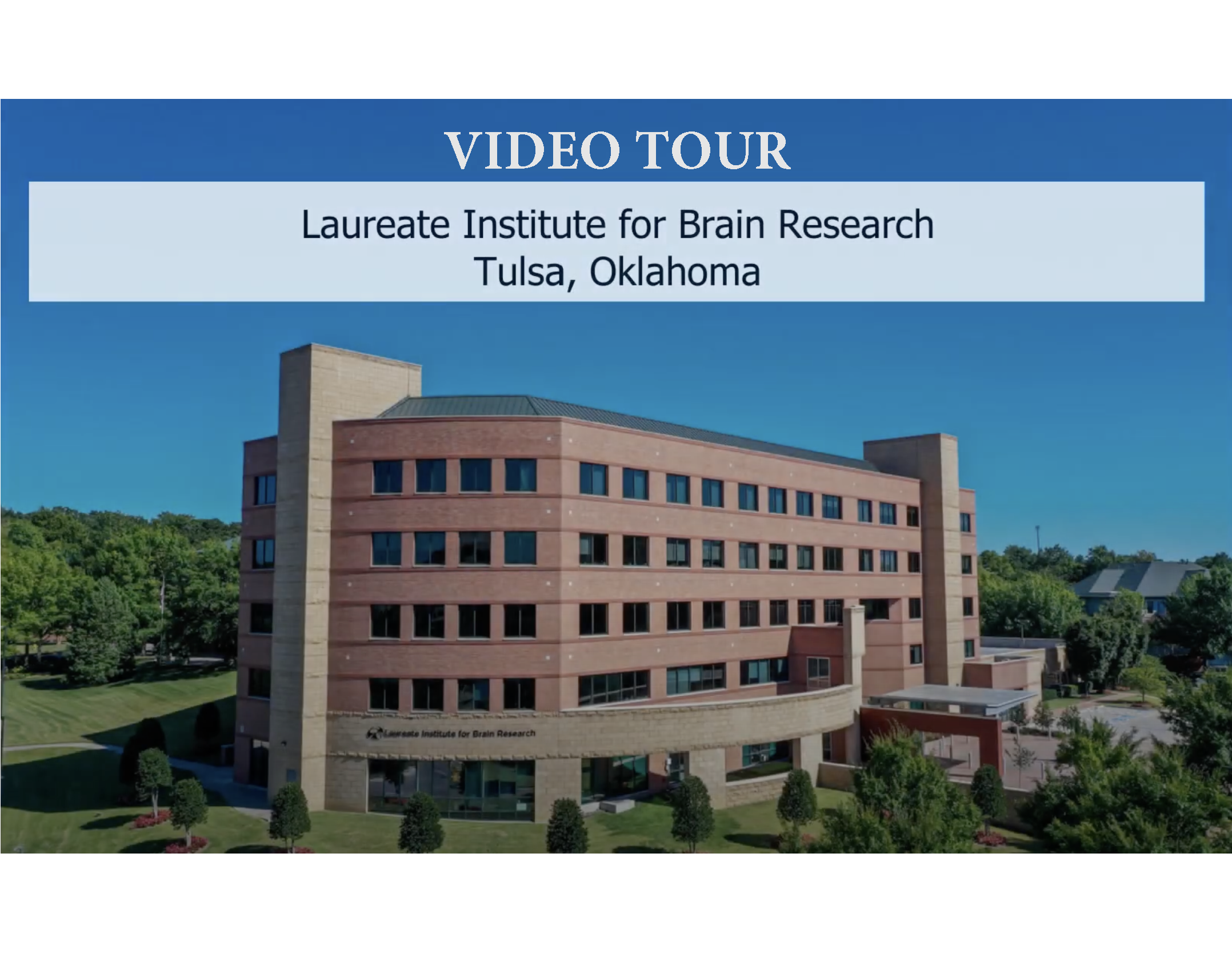
Laureate Institute for Brain Research
6655 South Yale Ave Tulsa, OK 74136
Contact:
Robin Aupperle Ph.D.
(918) 502-5744
raupperle@laureateinstitute.org
Supervision Provided:
A minimum of two hours per week of individual supervision
Intern Activities:
Individual and group therapy
Psychosocial assessments
Case management services
Treatment plan development
Clinical trials
Mental health and neuroscience research
Funding for 2025-2026:
$38,000
1 internship position
Payment is every other week
Time Intern is Expected to Be On Site:
36 hours (+4 hours per week for NOPIP didactics and group supervision)
Supervisor profiles below
Laureate Psychiatric Clinic and Hospital (LPCH) is a private, not-for-profit psychiatric facility that is affiliated with the Saint Francis Health System. The Saint Francis Health System also includes four medical-surgical hospitals and over 450 primary care and specialty physician practices. Laureate provides mental health treatment services for adults and seniors across the full continuum of care. Substance abuse treatment is provided for adults.
The Laureate Institute for Brain Research (LIBR) opened in 2009 and currently houses a multidisciplinary team of scientists and clinical research staff who apply neuroimaging, genetic, pharmacological and neuropsychological tools to investigate the biology and treatments of neuropsychiatric disorders.
Laureate currently provides two full time internship positions. The positions will be focused on obtaining experiences at both LIBR and LPCH, with the interns working with their supervisor to identify units most relevant to their training goals. Potential options for LPCH clinical experience include the Adult Behavioral Health Units, the Mental Health Intensive Outpatient Unit, Drug and Alcohol Addiction Intensive Outpatient Unit, and/or the Eating Disorders Program. LIBR clinical experiences focus on ongoing clinical trials. There are additional opportunities for administering structured psychosocial history and diagnostic interviews and brief neuropsychological assessment batteries at LPCH and LIBR.
One day per week will be reserved for research-focused training and activities at LIBR. Research activities may involve conducting literature reviews, data analysis, and preparing results for conference presentation or publication. These activities would be tailored to the interests of the intern through collaboration with supervisors and mentors. Interns will be encouraged to submit their research for conference presentation and/or publication. There are a number of different completed and ongoing research projects that interns can focus their research training and experience, including data from longitudinal and clinical outcome studies focused on depression, anxiety, or substance use, and utilizing multiple levels of assessments, including self-report, behavior, bioassays, neurofeedback, and neuroimaging (using functional magnetic resonance imaging and electroencephalography). This includes the Tulsa 1000 study, a longitudinal observational study of 1000 treatment-seeking individuals with mental health problems across the categories of mood, anxiety, eating, and substance use disorders and the Adolescent Brain Cognitive Development (ABCD) study, a large multi-site, longitudinal study following 9-10-year-old children over a 10-year period (https://www.laureateinstitute.org/abcd.html), and NIGMS-funded Center of Biomedical Research Excellence (CoBRE) focused on Neuroscience-Based Mental Health Assessment and Prediction (NeuroMAP; http://www.libr-neuromap.org) and several other NIH-funded studies.
Interns are also invited to participate in LPCH and LIBR staff development and continuing education programs. LPCH programs include all day workshops, training seminars, and monthly case conferences. Interns are also invited to attend the monthly “William K. Warren, Jr. Frontiers in Neuroscience” and the quarterly “Fostering Opportunity, Collaboration, and Understanding in Science (FOCUS)” Lecture Series hosted by LIBR.
To learn more about Laureate Institute for Brain Research, go to www.laureateinstitute.org.
Commitment to Understanding of Mental Health Disparities:
Alongside LIBR’s focus on enhancing scientific understanding and mental health treatment are goals of deepening our understanding of mental health disparities, improving generalizability of our research findings to our communities of focus, and enhancing the quality of science by increasing representation in the field by individuals from various communities and backgrounds.
We recognize that, historically, research was conducted in a way that was deeply painful to some groups of people, and the impact of systemic and structural biases on mental health are too often ignored or underestimated. We recognize that although there has been much improvement in how science is conducted, there is still much work needed to enhance our understanding of factors contributing to disparaties. We hold that there is no “finish line” to reach, rather the goal is to continually work toward conducting research that is positively impactful for the communities with whom we work.
For our NOPIP internship, we focus on not only better understanding the unique factors that contribute to mental health disparities, but also to consider how we can use this understanding to improve the mental health services we currently provide.




-

Robin Aupperle Ph.D.
Dr. Aupperle received her master’s and doctoral education in clinical health psychology at the University of Kansas. She completed clinical internship and postdoctoral training at the VA San Diego Healthcare System and University of California – San Diego (UCSD). Dr. Aupperle’s clinical training and experience has focused on empirically-supported treatments for anxiety disorders, depression, and PTSD, as well as neuropsychological assessment. Her research focuses on the use of translational neuroscientific and behavioral tools to better understand and improve mental health treatments. Dr. Aupperle joined the Laureate Institute for Brain Research (LIBR) and the University of Tulsa (TU) in 2014 where she is currently Associate Professor. At LIBR, she serves as Director of Translational Psychotherapy Research, Director of the Neurocognitive Aspects of Anxiety, Trauma, and Treatment (NeuroCATT) laboratory, Director of the Recruitment and Assessment Core, and site Co-PI for the Adolescent Brain Cognitive Development (ABCD) study. Her work has been funded by the National Institute of Mental Health (NIMH), National Institute on Alcohol Abuse and Alcoholism (NIAAA), National Institute on Drug Abuse (NIDA), National Institute of General Medical Sciences (NIGMS), and Department of Defense.
-

Evan White Ph.D.
Dr. White is a clinical psychologist and Principal Investigator at LIBR. He completed his doctoral training at Oklahoma State University under the mentorship of DeMond Grant, PhD and his clinical internship at the Charleston Consortium (Medical University of South Carolina & Ralph H. Johnson VA Medical Center) in Charleston, South Carolina. Dr. White’s clinical training if founded in generalist evidence based practice with a focus in outpatient treatment and neuropsychological assessment of adults emphasizing cognitive and behavioral approaches treatment. Dr. White also has experience with mindfulness based and acceptance and commitment based therapeutic approaches. His research program broadly aims to understand risk and protective factors for psychopathology among American Indian populations. His work employs neural and psychophysiological techniques (i.e., fMRI, event-related potentials) to probe cognitive functioning and understand how cultural characteristics (1) play a protective role against poor mental health (e.g., substance abuse, suicide) and (2) influence the developmental and maintenance of resilience. His work has been supported by the National Institute on Minority Health and Health Disparities (NIMHD) through a K99R/00 award and the National institute of General Medical Sciences (NIGMS) Center for Biomedical Research Excellence award (COBRE).
-

Emily Choquette, Ph.D.
Dr. Choquette received her bachelor’s degree in psychology from Wake Forest University, and her master’s and PhD at the University of South Florida under the mentorship of Diana Rancourt, Ph.D. and Kevin Thompson. Ph.D. Her graduate research focused primarily on the functional relationship between alcohol use and disordered eating. She received generalist clinical training with a focus on health psychology, eating disorders, and trauma. She has experience using a broad range of evidence-based psychotherapy approaches for a diverse range of clinical presentations. She completed her predoctoral clinical internship at the Michael E. DeBakey Veteran’s Administration Medical Center (MEDVAMC) in Houston, Texas in 2021.
Dr. Choquette joined LIBR in 2021 as a postdoctoral fellow and was promoted to Associate Investigator in 2023. Her primary research focus at LIBR is on interoceptive mechanisms in eating disorders and anxiety and the conduct of clinical trials of an interoceptively focused therapeutic tool for anorexia nervosa. She has also been involved in the implementation of psychotherapy clinical trials and the clinical translation and implementation of a digital mental health tool, the Tulsa Life Chart.
